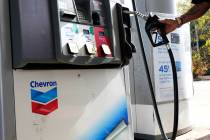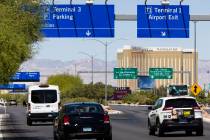Tips for getting your vehicle road trip ready this summer
The last thing you want to deal with during a summer road trip is a breakdown that leaves you stranded by the roadside. Giving your vehicle the once-over before you travel is the best way to prevent this from happening.
Tires
Nothing matters more for passenger safety than maintaining contact with the road. This means that checking the air pressure and tread depth are crucial to your pretrip inspection.
You’ll find an air hose at any local gas station but the air gauges attached to many of those air hoses tend to be inoperable or inaccurate. Do yourself a favor and invest in a good air pressure gauge and store it in your vehicle.
Check your owner’s manual or the sticker inside your driver’s door for the vehicle manufacturer’s recommended air pressure. The PSI rating found there will provide you with the safest and most comfortable ride.
The Max PSI listed on the tire sidewall is the maximum carry load for the tire, so your tire pressure should never exceed that number. Too much air combined with high speeds can lead to a blowout. Low tire pressure increases friction, increases wear and decreases fuel mileage.
New tires typically have approximately 10/32 inch of tread depth. According to Goodyear, a major manufacturer of tires, as long as your tires have at least 4/32 inch of tread, they will perform as designed.
Simply slide a ruler or tape measure into the tread to check the depth. You should replace your tires soon if the tread depth is 3/32 inch and you should replace them immediately if the tread depth is 2/32 inch or less.
Battery
Summer heat takes just as much of a toll, if not more, on your car’s battery as winter cold. Excessive heat accelerates corrosion and can cause fluid evaporation, which eventually leads to internal damage and battery death.
Unless your battery is designed to be maintenance free and sealed by the manufacturer, you may have to add water occasionally. Always used distilled water for the best results.
Before you leave on your summer road trip, check the battery terminals for corrosion. Use a brush with steel bristles and a mixture of water and baking soda to remove any debris that can interfere with maintaining a tight connection.
Fluids
Make sure oil and coolant levels are topped off before you pull out of your driveway. If you are nearing the date for your vehicle’s next oil change, go ahead and change it. You don’t want extreme heat turning your dirty oil to sludge, which can cause the engine to seize.
If the coolant in your vehicle is neon green, it is an ethylene glycol-based mixture that contains chemicals that prevent rust from building up. Orange colored coolant is also an ethylene glycol mixture, but it contains additional corrosion inhibitors making it a little more expensive.
Stick with the same coolant that is already in your engine because different types of coolants do not mix well. If the coolant looks dirty or is rust-colored, it’s time to flush the system and refill it with fresh fluid.





























